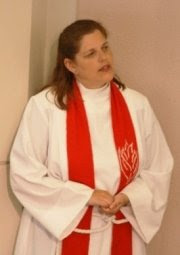You can join the discussion each week at one of three times:
Sunday 9:15 am; Wednesday 6:15 pm; Thursday 1:00 pm
A reading from a meditation on God’s love by Elizabeth Rowe
O Lord God, permit a worthless
creature to plead a little with you.
What honor will my destruction bring you? What profit, what triumph to
the Almighty will my perdition be? Mercy
is your brightest attribute; this gives you all your loveliness, and completes
your beauty. By names of kindness and
indulgence you have chosen to reveal yourself to us, by titles of the most
tender meaning you have made yourself known to my soul: title which you do not
yet disdain, but are still compassionate, and ready to pardon.
But that you have or will forgive
me, O my God, aggravates my guilt. And will
you indeed forgive me? Will you remit
the gloomy score, and restore the privilege I have forfeited? Wondrous love! Astonishing benignity! Let me never live to repeat my ingratitude;
let me never live to break my penitent vows; let me died before that unhappy
moment arrives.
Almighty Love, the theme of every
heavenly song! Infinite Grace, the wonder of angels! Forgive a mortal tongue
that attempts thy praise; and yet should we be silent, the mute creation would
find a voice to upbraid us.
But, oh, in what language shall I
speak? With what circumstance shall I begin? Shall I roll back the volumes of
eternity, and begin with the glorious design that determined our redemption
before the birth of Time, before the confines of Creation were fixed? Infinite years before the day, Or heavens
began to roll?
Shall I speak in general of all the
nations of the redeemed? Or to excite my own gratitude, shall I consider
myself, my worthless self, included, by an eternal decree, among the number of
those who should hear of a Redeemer’s name and be marked out a partaker of that
immense privilege? Before the
foundations of the hills were laid the gracious design was formed, and the
blessed plan of it schemed out before the curtains of the sky were spread.
Lord! What are we? What am I? what
is all the human race, to be so regarded? O narrow thoughts, and narrower
words! Here confess your defects. These
are heights not to be reached by you.
Adorable measures of infinite clemency! Unsearchable riches of grace! With
what astonishment do I survey you! I am
swallowed and lost in the glorious immensity.
All hail, you divine mysteries! You glorious paths of the unsearchable
Deity: let me adore though I can never express you.
Yet should I be silent, heaven and
earth, no hell itself, would reproach me; the damned themselves would call me
ungrateful, should I fail to celebrate that grace, whose loss they are for ever
lamenting, a loss that leaves them for ever desperate and undone. ‘Tis this grace which tunes the harps of
heaven, and yields them an immortal subject of harmony and praise. The spirits of just men made perfect fix
their contemplations here; they adore the glorious mystery, and while they sing
the wonders of redeeming love, they subscribe sublime and living honors to the
one who sits on the throne and to the Lamb for ever. And infinitely worthy are
you, O Lord, to receive the grateful homage.
Who shall not praise and magnify your name? who shall deny the tribute
of your glory?
But alas! What can mortals add to
you? What can nothingness and vanity
give? We murmur from the dust, and attempt your praise from the depths of
misery. Yet you condescend to hear and
listen to our broken accents; amid the hallelujahs of angels our groans ascend
to you, our complaints reach you; from the height of your happiness and from
the exaltations of eternal glory, you have a regard to us, poor wretched
humanity! You receive our homage with
delight, our praises mingle with the harmony of angels, nor interrupt the
sacred concord. Those natives of heaven
whose morning stars sing together in their heavenly beatitudes, nor disdain to
let the children of earth and mortality join with them in celebrating the
honors of Jesus, their Lord and ours. To
him be every tongue devoted, and let every creature for ever praise God. Amen.
Who shall not praise
God? What is grace? For what do we
praise God? How can we praise God enough?
Elizabeth Rowe
(1674-1737) was encouraged to write by Bishop Thomas Ken of Bath and Wells and
published several biblical character sketches.
Her devotional prose was not published until after her death. The fervor of her language embarrassed her
editor, who modified language that he considered too extravagant.
From A Time to Turn
by Christopher Webber

No comments:
Post a Comment